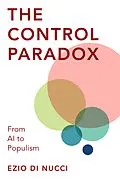Is technological innovation spinning out of control? During a one-week period in 2018, social media was revealed to have had huge undue influence on the 2016 U.S. presidential election and the first fatality from a self-driving car was recorded. What's paradoxical about the understandable fear of machines taking control through software, robots, and artificial intelligence is that new technology is often introduced in order to increase our control of a certain task. This is what Ezio Di Nucci calls the "control paradox."
Di Nucci also brings this notion to bear on politics: we delegate power and control to political representatives in order to improve democratic governance. However, recent populist uprisings have shown that voters feel disempowered and neglected by this system. This lack of direct control within representative democracies could be a motivating factor for populism, and Di Nucci argues that a better understanding of delegation is a possible solution.
Autorentext
Ezio Di Nucci is professor of bioethics and director of the Centre for Medical Science and Technology Studies at the University of Copenhagen. His recent monographs include Ethics in Healthcare (2018), Ethics Without Intention (2014) and Mindlessness (2013).
Inhalt
Part I: Introducing the Paradox
Introduction: The Control Paradox for Dummies
Chapter One: The Paradox
Chapter Two: Control and the Empowerment Illusion
Part II: Control and Delegation
Chapter Three: The Concept of Control and Direct Control
Chapter Four: Social Control and Technological Control
Chapter Five: Delegating Control and the Practice of Delegation
Part III: The Technological Paradox
Chapter Six: Control, Drones and Autonomous Weapons
Chapter Seven: VAR, Authority and Loss of Control
Chapter Eight: Self-Driving Cars and Meaningful Human Control
Chapter Nine: Smartphones from Empowerment to Surveillance: Local Control and Global Control
Chapter Ten: Health Data & Healthcare Algorithms (or: Medical AI)
Part IV: The Political Paradox
Chapter Eleven: Taking Back Control: From Brexit to Trump and the Control Paradox of Representative Democracy
Chapter Twelve: Delegating Responsibility?
References
